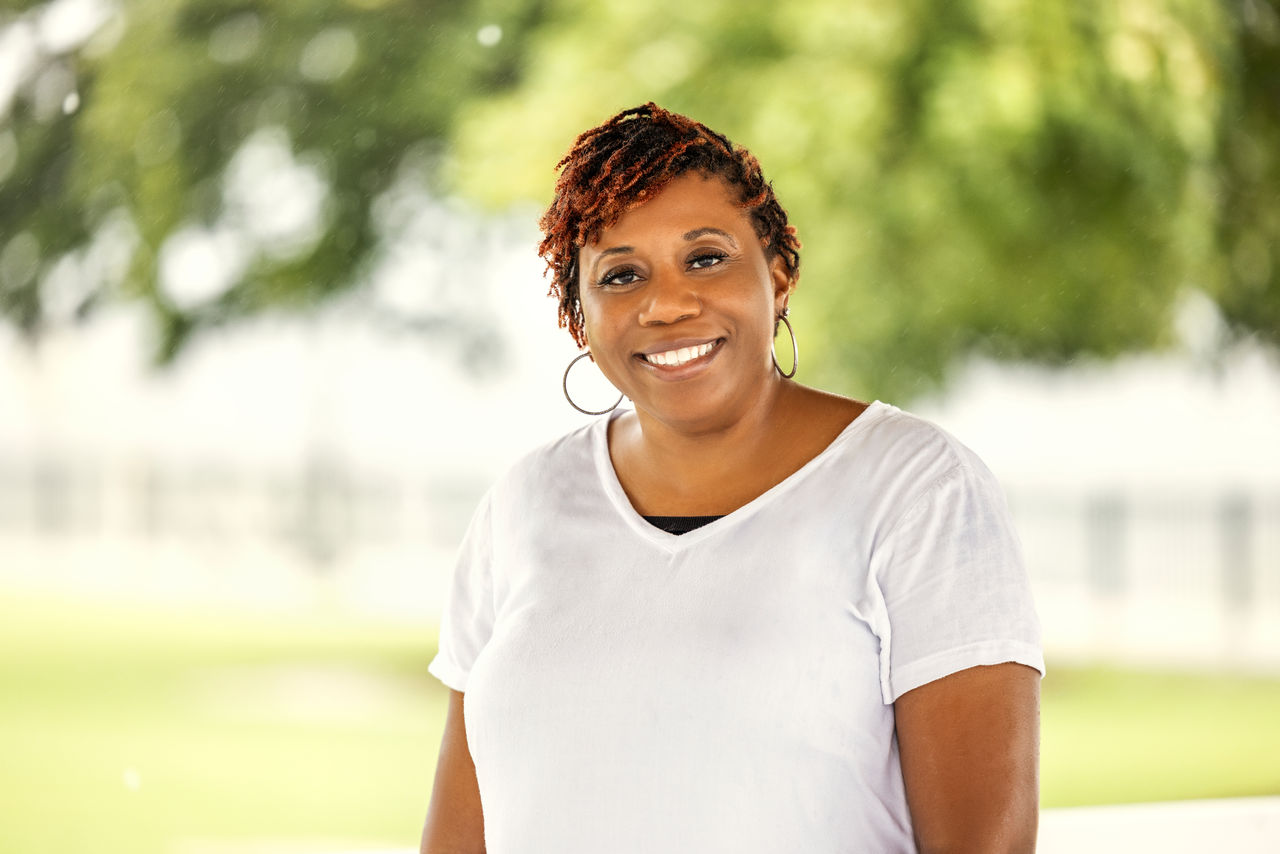
Expecting a baby is a life-altering experience, filled with questions about physical, emotional, and social well-being. Yet, for many pregnant women in North Carolina, finding answers is a daunting challenge. With a shortage of health care providers, countless expectant mothers are left without the guidance and support they desperately need.
Doulas have a long history as childbirth experts, providing emotional support and passing on their knowledge from generation to generation in cultures and communities across the world. In Jamaica, for instance, the “nana” was the main birth attendant for women, held in high regard and deeply respected for her healing abilities, intuition, and wisdom.
“That was my grandmother,” says Melba Perry, a community-based doula in Eastern North Carolina. “She was the town midwife in Jamaica. She delivered my sister and some of my cousins, so this work is kind of in my genes.”
Though Perry has been working as an OB-GYN medical assistant for 2 decades, her role as a doula didn’t begin until recently. Unfortunately, a tragedy led her there.
In April 2020, Perry’s world was devastatingly upturned when her 7-year-old son, Carter, was hit by a car and passed away. Though grief-stricken, Perry had 2 younger children to look after. She knew she needed a personal change that would embolden her to fight for her children, pick herself up, and bring more meaning to her life.
“I thought, ‘I have to have a purpose because I have two other kids,’” Perry says. And so, she began researching opportunities for doula training, diving into her family roots.

Doulas serve as informational support systems and emotional companions to patients and their families, guiding them through the birth process and improving communication between patients and providers. According to a research study by The Journal of Perinatal Education, “doula-assisted mothers were four times less likely to have a low birth weight baby, two times less likely to experience a birth complication involving themselves or their baby, and significantly more likely to initiate breastfeeding.”
The most recent March of Dimes report card (PDF) shows 21% of NC counties are considered maternity care deserts – areas lacking access to birthing facilities or maternity care providers. In rural parts of the state, which comprise 78 of the 100 counties, 61% of women live over 30 minutes from a birthing hospital. This type of limited access to care increases a woman’s risk of maternal morbidity and adverse infant outcomes, which are higher among Black mothers and their babies. Blue Cross and Blue Shield of North Carolina (Blue Cross NC) is working with partners on various initiatives to reduce these challenges and risks, including efforts to expand doula care.
“We are there for the mom, but not only them. We are there for the family members as well,” Perry says. “Our goal is to make sure that Mom is okay, that she is well-informed, that she knows she has choices, that she knows how to advocate for herself and that her voice is heard.”
Doulas are also trained to recognize mental health issues, including depression, anxiety, and substance use disorders, which affect 1 in 5 women. The CDC has found that 1 in 8 women experience postpartum depression and 50% are untreated.
Perry, herself, has had to acknowledge her own need for mental health care. Upon the third anniversary of Carter’s passing, Perry was preparing to work as a doula in a new community-based maternal health project. That was when she took an honest look at herself.
“As a doula, I know how important energy is, how important mental health is. Not just for moms, but for doulas too,” Perry says. “If you're going to be around mothers, helping them bring their babies into the world, you have to be in a good mental space. I was trying to push myself, but I wasn’t there.”
Putting her doula practice on pause, Perry instead assisted with recruitment for the project, started therapy, and focused on her own healing. She soon made her way back to her path of purpose.
In January, Perry applied for a new doula training program called SEEDS ENC, which stands for Supporting, Educating, and Engaging Doulas to Serve Eastern North Carolina. The pilot program out of East Carolina University’s (ECU) Brody School of Medicine seeks to build a sustainable doula community in Eastern North Carolina to offer support, advocacy, and resources for expectant families. The idea behind SEEDS ENC stemmed from Birthing Companions – a program at ECU Health Medical Center in which health care learners and undergraduate volunteers assist patients during the labor process – from running an errand to holding a hand.
But the needs of a mother begin well before labor and continue far beyond it. SEEDS ENC was created to bridge that gap.

“We started to brainstorm on how to expand Birthing Companions,” says Dr. Karlene Cunningham, an associate professor in the Department of Psychiatry and Behavioral Medicine at Brody School of Medicine and director of SEEDS ENC. “We needed a home base to support, educate, and engage doulas and a model that supported the population that we serve and the high-risk pregnancies that we often see.”
Blue Cross NC recognizes the urgent need to improve perinatal health outcomes in Eastern North Carolina. “Between 2019 and 2021, the state’s perinatal mortality rate doubled from 22 to 44 per 100,000 births. This crisis is particularly severe in Eastern North Carolina, where access to health care is often limited by transportation barriers and a lack of health care infrastructure,” says Gray Williams, a senior regional liaison on the Blue Cross NC County Engagement Team. “Our interest in contributing to SEEDS ENC stems from their commitment to addressing critical health disparities and ensuring that all communities have access to essential health care services.”
This partnership with Blue Cross NC will help foster the growth of the program and ensure the continued availability and affordability of professional doula services in Eastern North Carolina.
“Improving the birth experience has a preventative impact on subsequent developments of perinatal mood and anxiety disorders, which is the number one complication of pregnancy,” Cunningham says.
She believes there is great value in having 1 maternal professional focused solely on the mother-to-be. However, she notes that doulas are only 1 piece of the puzzle and alone can’t solve for the shortage of maternal care providers.
“My hope is that this program will transform Eastern North Carolina so that doula care is a common occurrence, providing another facet of the birth workforce that can support pregnant people in our region,” she says.

In March, SEEDS ENC enrolled its first cohort of 8 prospective doulas. As part of the program, they receive a free 3-day training by DONA International, the world’s first, largest, and leading doula-certifying organization. Completion of the program requires doulas to assist pro bono with 3 births. Doulas meet with each client at least twice both before and after birth and are at their client’s side during labor and delivery.
Doulas receive training in trauma-based care and parental mood and anxiety disorders. They are also provided with 6 months of mentorship and ongoing business skills training, including marketing and website development, to help them with outreach and engagement in their communities. The doulas network and build their client base via the program’s connections to local clinics and the ECU hospital system.
Among Perry’s clients is Candice Bizzell-Hicks, due with her fourth baby in November. The foundation of trust between doula and client was already laid, as the 2 are family friends. Bizzell-Hick’s son, Amir, was a classmate and friend of Carter.
For Bizzell-Hicks, hiring a doula was a must, given her previous difficult deliveries. She says she had suffered a postpartum hemorrhage, a dilatation and curettage, and an incorrectly injected epidural. Perhaps just as traumatizing, she felt unheard as she was unable to labor how she wanted to.
“Anybody who has had a child knows that it’s hard to advocate for yourself and your baby,” Bizzell-Hicks says.
During this pregnancy, Bizzell-Hicks has leaned on Perry. She was recently diagnosed with a subchorionic hematoma – a collection of blood that forms between the uterine wall and the chorionic membrane during pregnancy. Perry has been there to walk her through it all: the questions to ask, options to consider, and actions to take.
“I’ve watched Melba through her doula journey. And when I found out I was pregnant, I knew I wanted her to be my doula,” Bizzell-Hicks says. “She keeps me encouraged. She’s my thought clarifier. She knows what I want and she’s going to advocate for me.”
The program has well-prepared Perry and her fellow SEEDS ENC doulas to launch their maternal support services across the rural areas of North Carolina. They will officially complete the program in December and come Spring 2025, a second cohort will begin. Though the program won’t entirely solve for the maternity deserts in Eastern North Carolina, with every doula out there, more women will better understand their choices, increase their likelihood of a healthy rewarding pregnancy, and learn how to advocate for themselves.
“This work is what I’m supposed to be doing. It’s my earthwork,” Perry says. “We have to get back to how birth is supposed to be. The whole experience – from pregnancy to labor to postpartum – it should be joyful.”


Blue Cross and Blue Shield of North Carolina does not discriminate on the basis of race, color, national origin, sex, age or disability in its health programs and activities. Learn more about our non-discrimination policy and no-cost services available to you.
Information in other languages: Español 中文 Tiếng Việt 한국어 Français العَرَبِيَّة Hmoob ру́сский Tagalog ગુજરાતી ភាសាខ្មែរ Deutsch हिन्दी ລາວ 日本語
© 2026 Blue Cross and Blue Shield of North Carolina. ®, SM Marks of the Blue Cross and Blue Shield Association, an association of independent Blue Cross and Blue Shield plans. All other marks and names are property of their respective owners. Blue Cross and Blue Shield of North Carolina is an independent licensee of the Blue Cross and Blue Shield Association.
